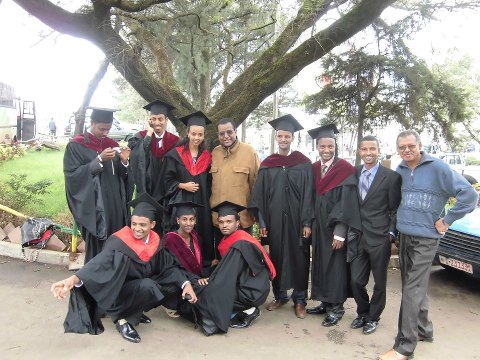(Photo caption: MScN 2012 Graduates. Addis Ababa University)
Six years and seven visits later, Dr. Amy Bender has played an integral part in the collaboration between Bloomberg Nursing and the largest university in Africa, Ethiopia’s Addis Ababa University Department of Nursing (AAUN). She has led this initiative to develop strong nursing leaders, through research capacity-building, by supporting AAUN’s Masters of Science in Nursing (MScN) with a strong team of Canadian and Ethiopian colleagues. The results have produced strong graduates who are determined to improve the numerous health challenges in the geographically and culturally diverse country they call home.
The most recent visit by the Bloomberg Nursing lecturer was especially poignant for Dr. Bender as the trip began to wrap-up the research capacity focused phase of the collaboration.
“Key partnerships like this one with Addis Ababa University take time, and international work is about relationship building,” said Dr. Bender. “What the University and the nursing students communicated to me is a desire to change the practice and build the nursing profession in Ethiopia. To work with these keen students and staff to strengthen nurses’ capacity development through research has been such a privilege.”
Over the years, Dr. Bender has fostered key relationships with her Ethiopian counterparts Amsale Cherie, research lead and director, Nursing Department at AAUN and Asrat Demissie, former director of AAUN, which has become the driving force behind the success of the program. This relationship also involves numerous peers and colleagues through the Toronto Addis Ababa Academic Collaboration (TAAAC) and specifically, close association with TAAAC coordinator Dr. Clare Pain and other Toronto-based departmental leads.
In the last three years, the nursing team has delivered curriculum that strengthens research knowledge and skills to a cross-section of graduate students from all regions of Ethiopia. These students, most sent from the Ministry of Health of Ethiopia, recognize that improving health outcomes for the population comes by developing the capacity of nurse leaders.
“During my last few trips, there were two students that really stood out for me as ambassadors for these new nursing leaders,” said Dr. Bender. “Atsede and Tesfa spoke passionately about the importance of building the nursing profession through higher education and research, and I am confident they will ultimately have a positive impact on the health of their patients and the country overall.”
With the program graduatingapproximately 100 MScN students since 2010, a bolder, more sustainable health care education model in Africa is underway.
As the research chapter of this higher education partnership comes to an end, another chapter begins. The next phase, with a clinical focus on critical care, is in development. Addressing the priority areas of ICU, emergency, and peri-operative care, this new program evolves from what Dr. Bender and her interprofessional colleagues have learned from their work together, and from student feedback. Drs Bender and Cherie have recruited the help of Dr. Louise Rose, assistant professor at Bloomberg Nursing and Vanessa Wright, nurse practitioner at Women’s College Hospital, to lead and help implement the new curriculum.
This new Masters of Science in Critical Care Nursing, beginning in the fall of 2013, is the first program of its kind in Ethiopia and will provide a blueprint for other clinical streams of graduate education at AAUN.
